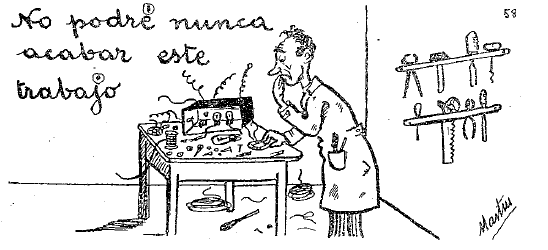
| Языки :: Испанский |
| Аудио |

 |
|
 |
|
159 |
Español |
Spanish |
|
Lección Cincuenta y ocho (58) |
||
| Eso nos vendrá bien | That will do us good [come to us good]. | |
| 1 | Si quiere usted, don Pedro, podemos tomar café juntos. | If you want, don P., we can take coffee together. |
| 2 |
¿Decía usted?... Oh perdone, no había caído en ello (1). Es la primera vez que me llaman don Pedro, |
(What) were you saying? Oh pardon me, I had not understood [fallen into
it]. It's the first time that somebody calls me don P., |
| 3 |
y me ha sorprendido. No me figuraba que se trataba de mí. |
and (it) has surprised me. I did not imagine that I was concerned. |
| 4 |
Se acostumbrará usted pronto. Aquí es costumbre emplear el nombre, y no el apellido. |
You will get used to it quickly. Here it's the habit to use the Christian name, and not the family name. |
| 5 |
¿Adónde iremos (2)? — En la esquina hay un café con orquesta, pero va poca gente, y se aburre uno; |
Where shall we go? — Round the corner there's a café with an orchestra, but few people go there, and one feels dull; |
| 6 | si a usted le gusta andar, iremos a un café más céntrico y más concurrido. | if you like ([it pleases you] to walk, we shall go to a more central and more frequented. |
| 7 | Como usted quiera. Un paseíto (3) nos vendrá bien. | As you [will] want. A short walk will do us good [come to us good], |
| 8 | Salimos don Enrique y yo, y nos dirigimos, hacia (4) el centro. | We go out, don Enrique and myself, and repair towards the centre. |
| 9 | Después del calor del día, agrada tomar el fresco. | After the heat of the day, it is agreeable [agrees] to enjoy [take] the cool. |
| 10 |
Llevo la cabeza muy alta : ya no soy sencillamente Lebrun, soy don Pedro. |
I carry my [the] head very high; I am no more [already] simply Lebrun; I am don Pedro. |
| EJERCICIOS | EXERCISE : | |
| 1 | Algunas frases sueltas, con el verbo poder : | A few separate sentences, with the verb poder (can or to be able; may or to be allowed). |
| 2 | ¿Puede usted ayudarme? | Can you help me? |
| 3 | Lo siento, no puedo. | I regret (it), I cannot. |
| 4 | ¿Podemos empezar? | Can we begin? |
| 5 | ¿Podría usted venir por la tarde? | Will you be able to come in the afternoon |
| 6 | No podré nunca acabar este trabajo. | I shall never be able to finish this work. |
| 7 | Intenté, pero no pude. | I tried, but I could not. |
| 8 |
¿No podía usted hacerlo de otro modo? — No podía |
Could you not (Were you not able to) do it in another way? — I could not. |
| 9 | No he podido escaparme. | I have not been able to escape. |
| NOTES. | |
| 1 | Caer en ello : "to fall into it", to catch (the meaning), get it. |
| 2 |
Where with an idea of motion, is adonde. Where is he? : ¿Dónde está?; Where (whither) does he go? : ¿Adónde va? But this rule is often ignored. — La orquesta, the orchestra. |
| 3 |
Un paseo (hard s), a walk, stroll; un paseito, a short walk. |
| 4 |
Hacia, towards, not to be mistaken for hacía,
was doing. Hacia (or : cerca de) las cuatro hacía mucho viento, Towards 4 there was [made] much wind. — Towards meaning in the direction of is always hacia, not cerca de, which is about. |
|
To-day you must read over again the 2nd lesson, translating from English
into Spanish, and you must go on like this reading again one previous lesson for each new one. |
